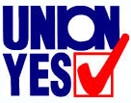Delegate credentials for the first SMART Convention in Las Vegas have now been emailed to all Transportation Division local secretaries, except those secretaries for whom no email address was available. This credential is for the so-called “automatic delegate,” that is, the local delegate of record and presumed to be attending the Transportation Division Convention in San Diego.
If your local is going to be represented in Las Vegas by the alternate delegate, the local secretary must email smartbase@smart-union.org advising that the alternate delegate will be attending. Information contained in the email about the alternate delegate should include: the last four digits of the social security number, first and last name, email address, telephone number and street address.
Once the alternate delegate information is received and confirmed, a new credential will be created for the alternate delegate and emailed to the local secretary.
Upon receipt of these delegate credentials, they must be properly executed by the local and the duplicate credential returned to the SMART offices in Washington, D.C. The original credential must be properly executed by the local and given to the delegate for presentation at registration upon arrival at the Las Vegas convention.
For those locals electing additional delegates for attendance in Las Vegas, the secretary must be a registered SMART Base user in order to submit the required election information. To become a SMART Base registered user, visit http://smartbase.versiform.net.
Delegates and guests should go to the “Cvent” registration site in order to properly register for the convention. The web site for this purpose is http://cvent.com/d/z4qs82.
It is very important that the handling of credentials and registration of delegates and guests be completed as soon as possible to avoid any potential delays or problems upon arrival in Las Vegas for the first SMART Convention.
If there are any questions, feel free to contact the SMART offices in Washington or Cleveland, or email questions to smartbase@smart-union.org.
 Judge Peter Economus of the U.S. District Court for the Southern District of Ohio ruled Wednesday, June 11 in favor of a motion for summary judgment to permanently maintain the final three days of early voting.
Judge Peter Economus of the U.S. District Court for the Southern District of Ohio ruled Wednesday, June 11 in favor of a motion for summary judgment to permanently maintain the final three days of early voting. The railroad industry is warning the White House against some potential safety rules for trains carrying explosive crude oil, saying freight and passenger rail traffic could be disrupted for years if companies must obey 30 mph speed limits, install more sophisticated brakes and keep the trains manned at all times.
The railroad industry is warning the White House against some potential safety rules for trains carrying explosive crude oil, saying freight and passenger rail traffic could be disrupted for years if companies must obey 30 mph speed limits, install more sophisticated brakes and keep the trains manned at all times. WASHINGTON — Congressional Republicans this week are trying to drive another spike, or two, into the heart of California’s high-speed rail program.
WASHINGTON — Congressional Republicans this week are trying to drive another spike, or two, into the heart of California’s high-speed rail program. United Food and Commercial Workers (UFCW) Local 1473 has announced that a 100 percent union grocer, Metro Markets, opened in Madison, Wisconsin Tuesday, June 10.
United Food and Commercial Workers (UFCW) Local 1473 has announced that a 100 percent union grocer, Metro Markets, opened in Madison, Wisconsin Tuesday, June 10.
 SEPTA moved Monday to impose management’s terms in a long-running labor dispute with Regional Rail workers, which union leaders said could prompt a strike that would halt all commuter rail service at 12:01 a.m. Saturday.
SEPTA moved Monday to impose management’s terms in a long-running labor dispute with Regional Rail workers, which union leaders said could prompt a strike that would halt all commuter rail service at 12:01 a.m. Saturday. If you find yourself in need of a doctor, and you don’t know if one practices near you, or if they participate in Medicare, and you have internet access, you can use the ‘Physician Compare’ tool at
If you find yourself in need of a doctor, and you don’t know if one practices near you, or if they participate in Medicare, and you have internet access, you can use the ‘Physician Compare’ tool at